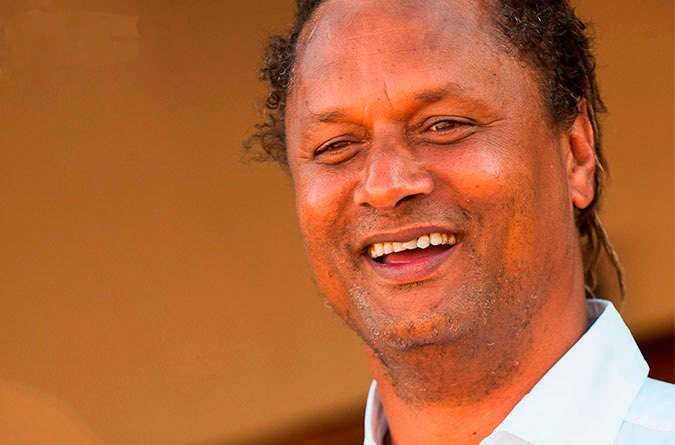
2022 Recipient
Dr. Willy Chambulo
Founder, Kibo Safaris, Tanganyika Wilderness Camps & Tanganyika Foundation
Willy grew up in a mud hut in a small village in Northern Tanzania. His parents could only afford 7 years of formal education, after which Willy headed to Arusha to work as a mechanic. He worked his way up and went on to create the best safari business in the country.
Willy believes that one of the best ways to help people is to educate and employ them. Today Kibo Guides and Willy’s other company Tanganyika Wilderness Camps operates 11 lodges and 10 mobile camps. They train and hire guides and staff from neighboring villages and currently employs 870 Tanzanians.
As president of Tanzanian Association of Tour Operators, Willy’s generosity is legendary both in terms of his humanitarian work and his willingness to help other young entrepreneurs launch and grow their businesses respectfully and responsibly.
Through his Tanganyika Foundation Willy supports a Maasai girls’ school in Arusha, rural medical clinics, and several other schools and villages. For 20 years, he has been our key advisor and partner in Tanzania for our Water Sanitation and Hygiene (WASH) initiative, as well as our collective work to improve schools and support rural villages. To date through the Grand Circle Foundation, we donated $2.1M to more than 30 village in support of 22 schools, including the investment of $544,428 for WASH projects including wells, water filters and toilets.
Willy helped Harriet Lewis design and operate the Next Generation Leaders program, for rising college freshmen from Dorchester, Roxbury and Mattapan. The capstone event is the trip of a lifetime to Tanzania. These students interact with young student leaders in Tanzania.
Willy is very proud of his Maasai heritage. He has shared his beloved homeland, love of nature and respect for the Maasai, Barabaig and Mandoke people with tens of thousands of travelers. His programs give visitors a change to learn more about the native people of Tanzania.
He was a lead supporter of the Serengeti De-Snaring Program to stop poaching by removing thousands of snares and releasing hundreds of caught animals. Promoting responsible tourism protects the sacred landscape of the Serengeti.
Moral Courage In Leadership Award

2023 Recipient
Bradley Campbell
President, Conservation Law Foundation
For more than 30 years, Bradley M. Campbell has been at the forefront of shaping the country’s most significant environmental policies and laws. A former White House senior appointee during the Clinton administration, Brad was the regional administrator at the U.S. Environmental Protection Agency Mid-Atlantic Region and served as commissioner of the New Jersey Department of Environmental Protection.
Brad has a wide range of experience overseeing large public agencies, developing strategic litigation, and negotiating innovative agreements that have resulted in environmental milestones in New England and across the United States.
Under Brad’s vision, the Conservation Law Foundation (CLF) has become a leader in the effort to address the root cause of climate change—greenhouse gas emissions from the burning of fossil fuels. Part of this vision has meant going after the “Goliaths” of the industry and CLF has taken on some of the biggest—ExxonMobil, Shell and Gulf Oil. Exposés by InsideClimate News and the Los Angeles Times confirmed that oil giant ExxonMobil knew as early as the late 1970s that climate change caused by human activities would be devastating if left unchecked.
Shortly after Brad started his tenure at Conservation Law Foundation, he made the brave decision to hold “Big Oil” accountable. CLF started its own investigation into how climate deceit has affected New England communities. Their investigation revealed that despite knowing the harm climate change could cause, ExxonMobil, Shell and other companies left their oil storage facilities in areas vulnerable to flooding from storms and rising seas.
This failure to act put local communities at risk of catastrophic releases of oil and hazardous substances—events more and more likely given the extreme weather and bigger storms already experienced by New Englanders every year.
To hold ExxonMobil accountable for its inaction, CLF launched the United States’ first legal action against the corporate giant for its climate deceit and for clean water act violations at its oil storage facility in Everett, which sits on the Mystic River. Last year, Exxon Mobil closed their facility.
Today, Brad and his team press on. Their climate deceit litigation against Shell Oil in Rhode Island was the first major climate adaptation litigation against a major oil company to move past a motion to dismiss and is now the first such case to be scheduled for trial.

2022 Recipient
Doc Hendley
Founder, Wine to Water
One night Doc Hendley had a dream with the words “wine to water” repeating in his head. As a bartender and son of pastor, he thought it strange—Shouldn’t it be water to wine? He got up in the middle of the night, turned on his computer and learned all he could about the water related deaths and disease and how so many people around the world lacked access to clean water.
Doc started to raise funds to help. Six months later, he was living in Sudan installing water systems for victims of government-supported genocide. He would go on to found Wine to Water, which has impacted more than 1.4 million people.
Doc is one of the most hardworking, persistent and effective leaders we know. Since 2018, we have supported Doc’s work to bring water to rural villages. Most recently we helped Doc purchase an oil rig in Tanzania so he can drill faster and cheaper. He already dug his first well at a Grand Circle Foundation-supported school, Eluway, in the Tarangire region. Most recently, Doc and his team have completed heroic work to get 12,500 portable water filters into Ukraine, impacting 150,000 lives.
Wine to Water’s work includes building and deploying water filters, drilling new water wells or fixing broken ones, constructing latrines and educating people on proper water, sanitation and hygiene methods as well as disaster preparedness. Read this interview with Doc in Conscious Magazine.

2021 Recipient
Patricia Gualinga
President, Fundacion Tiam
Patricia Gualinga has worked for decades as a vital, internationally-recognized voice against oil extraction and destruction of the Amazon Rainforest. Patricia is an Indigenous rights defender of the Pueblo Kichwa de Sarayaku (Kichwa People of Sarayaku), an Indigenous community in the Ecuadorian Amazon.
Without their consent, communities in her area only learned that their land had been opened for oil exploration when strange helicopters arrived, followed by ‘men with guns’. In 2012, Patricia was one of the representatives in a case presented to the Inter-American Court of Human Rights in which the government was found guilty of rights violations and of authorizing oil exploration and militarization of Sarayaku lands without consulting the community. It was an all too rare victory for Indigenous tribes.
Patricia describes recent times as “apocalyptic” for her village of 1350 people. The confluence of a massive oil spill, the pandemic and historical flooding have devastated her community. Yet despite everything, she persists and still holds hope because as she says, “there is so much to protect.”
Along with being the president of Fundacion Tiam, Patricia is also actively involved with Women Defenders of the Amazon against Extraction and REPAM (Pan-Amazon Ecclesial Network). As with so many Indigenous leaders, her work is dangerous and Patricia has suffered attacks, threats and harassment.
Her courage inspires us and we stand with Patricia to demand justice. We are deeply indebted to her vital contribution and leadership around Indigenous rights and the protection of this Earth we share.
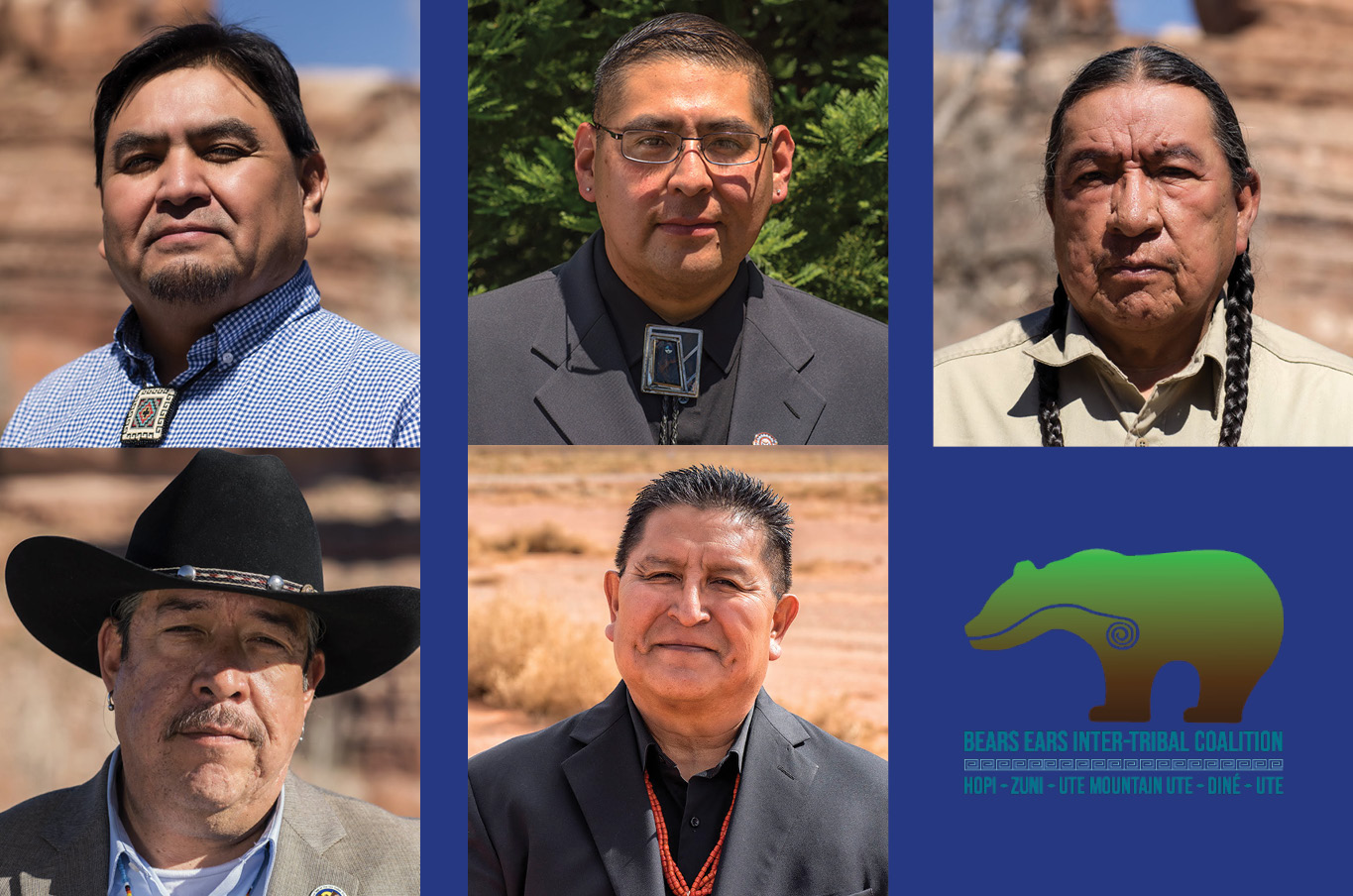
2019 Recipient
Bears Ears Inter-Tribal Coalition
James Aadaki, DINÉ
Carleton Bowekaty, ZUNI PUEBLO
Terry Knight, UTE MOUNTAIN UTE
Shaun Chapoose, UTE INDIAN TRIBE
Clark Tenakhongva , HOPI TRIBE
In July of 2015, leaders from the Hopi Tribe, Navajo Nation, Ute Mountain Ute Tribe , Pueblo of Zuni, and Ute Indian Tribe founded the Bears Ears Inter-Tribal Coalition. The Coalition represents a historic consortium of sovereign tribal nations united in the effort on multiple fronts to work collaboratively to protect and promote sacred, spiritual, historical, natural, scientific and cultural resources on lands within the Bears Ears landscape. The leaders of the Coalition have shown exceptional moral courage in their advocacy for an internationally significant cultural landscape in the face of extreme opposition, racial slurs, and difficult politics. Putting aside significant differences and past tensions between tribes, these elected representatives created a movement and set an example for indigenous leaders around the United States and the world.
These leaders successfully convinced President Obama to protect 1.35 million acres of their sacred homelands and now they continue to defend their ancestral lands from attacks by the current Administration. Importantly, they’ve done all this with an intentional focus on healing and incorporating Traditional Knowledge into public land management. While many moments would have tempted lesser people to respond with cynicism or despair, these leaders have taken the “high road” and remain committed to planning so that future generations may enjoy an ecologically resilient landscape of great cultural significance.
It’s worth noting that all the leaders of the Coalition manage many responsibilities (both political and cultural) within each of their communities that require huge time commitments beyond their involvement in Bears Ears advocacy. Despite this, these leaders have given nights, weekends, and vacations to be where they had to in order to stand up for sacred lands. Whether it be meeting with the Secretary of the Interior, testifying before Congress, meeting with grassroots organizations, or conducting ceremony with the next generation of Native leaders on the Bears Ears landscape, each one of the Coalition leaders have exhibited uncommon grace and courage in the face of adversity and serve as an example to us all.
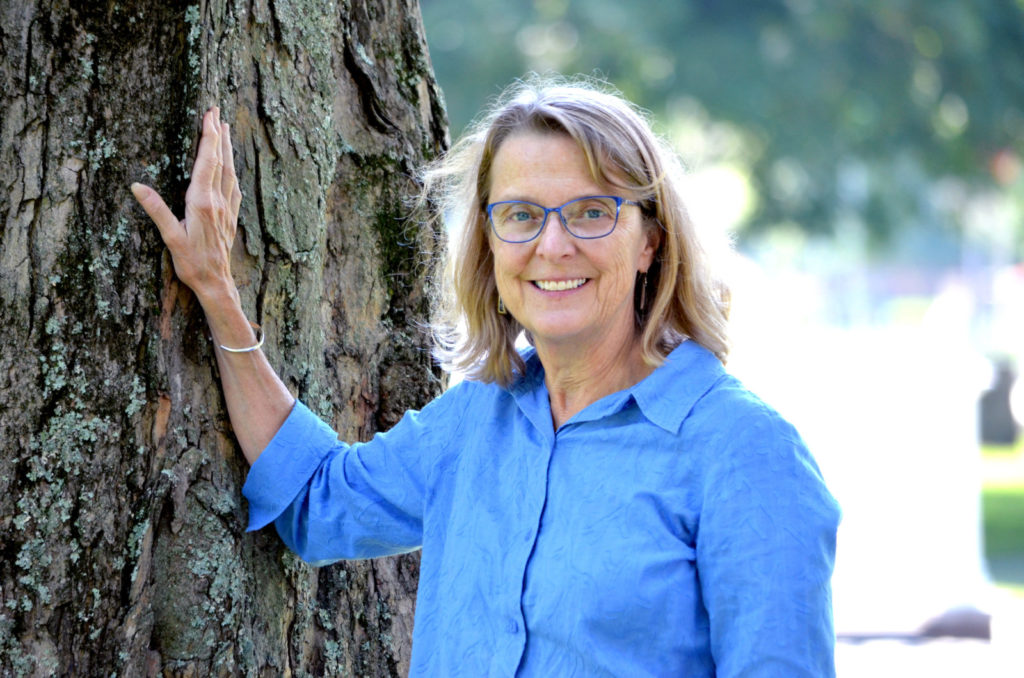
2018 Recipient
Jane Difley
President, Society For the Protection of New Hampshire Forests
Recognizing that land protection is only as strong as our willingness to defend it, Jane Difley demonstrated exemplary moral courage and leadership in defending New Hampshire landscapes against the development of the Northern Pass transmission line. Eight years ago, when Northern Pass first revealed its plan to despoil a 192-mile corridor from the Canadian border to Deerfield, New Hampshire, Jane declared that the Forest Society was “all in” and put the more than 100-year-old land conservation organization on the front lines.
Jane persisted in the face of monetary enticements and loss of support from certain facets of the business community. Her group was targeted with irate letters, phone calls and public declarations that the Forest Society should back down. Nonetheless, her team mobilized to enact strategies that included: conserving lands targeted by Northern Pass; mounting a legal challenge based on private property rights; spearheading the effort to pass state legislation preventing Northern Pass from gaining eminent domain access; educating every landowner in the 31-town corridor; placing staff at every state and federal public hearing; and mounting formal intervention at federal and state permitting processes.
One measure of a good leader is the caliber of their team. Not surprisingly, Jane gives credit to the guts, smarts and tenacity of her team at the Forest Society.
Alnoba International Indigenous Leadership Award
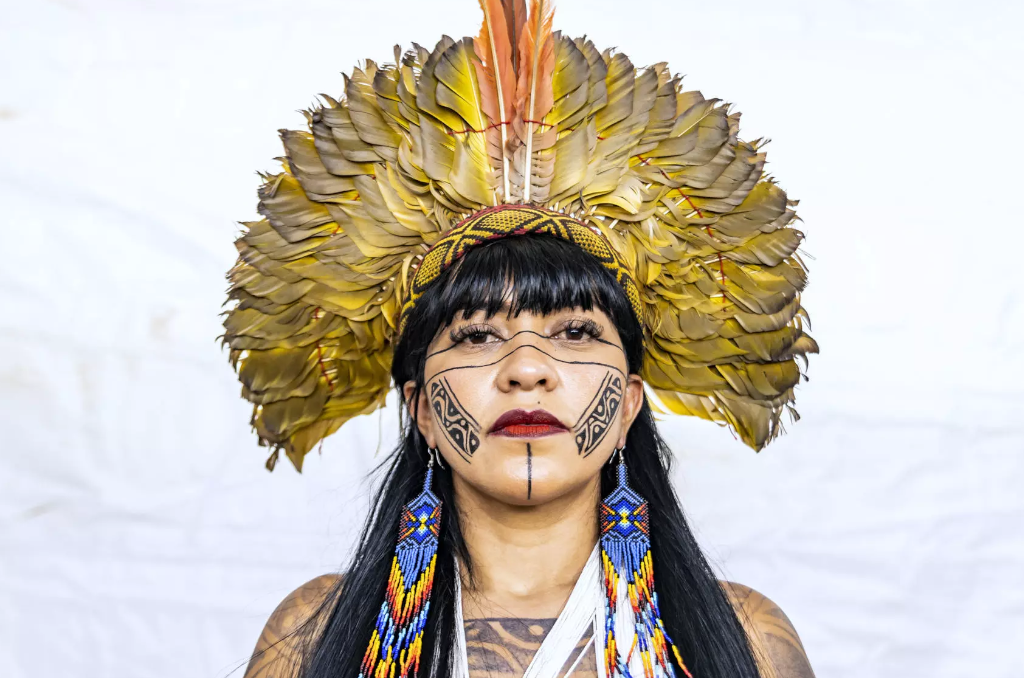
2023 Recipient
Célia Xakriabá
Indigenous Representative, Brazil Chamber of Deputies (Congress)
Célia Xakriabá is a teacher, poet, and activist from the Xakriabá people in the Cerrado biome of Brazil. She is one of the founders of the National Association of Ancestral Indigenous Women Warriors (ANMIGA) and a leading member of the Indigenous women’s movement in Brazil. She also helped to create the “Reforesting Minds” movement based on Indigenous ancestry and wisdom which advocates for a change in consciousness among the global public about planetary preservation.
Brazil’s territory contains 60% of the Amazon, of which 21% has been destroyed, an area three times greater than the United Kingdom. Today’s deforestation rate is pushing the Amazon to what scientists call a “point of no return,” beyond which the rainforest won’t be able to maintain its own climate and will turn into a dry savanna, emitting more planet-warming greenhouse gasses than it absorbs. This grim scenario is already playing out in heavily deforested parts of the Brazilian Amazon.
Since 2017, Xakriabá has spoken at various conferences and debates at universities in Brazil, promoting, among other things, advancing the status and rights of Indigenous women, land rights, education, and encouraging the revitalization of native languages in Brazil.
In 2015, Xakriabá became the first Indigenous person in the education department of Minas Gerais state. She held the position from 2015 to 2017. Xakriabá promotes an expansion of the inadequate educational system in Brazil to include teaching Indigenous history, land rights, and traditional knowledge that is shared collectively.
Her biggest dream is “to have the right to go back to sleep peacefully, because there are 523 years that Indigenous peoples don’t have the right to go back to sleep in the tranquility that they deserve,” referring to the more than half-millennium since the Portuguese conquest of South America in 1500.
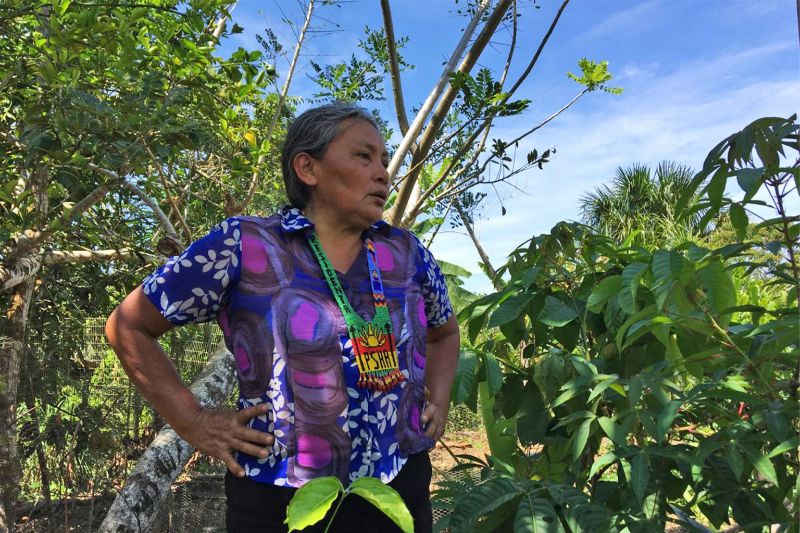
2022 Recipient
Josefina Tunki
President, Shuar People of Ecuador
Josefina Tunki lives and travels in the heart of the Cordillera del Condor from where thousands of tons of gold and copper are extracted. She is the first female president of the Shuar People in Ecuador. In recent years, she has become the Indigenous leader who is the face of the anti-mining struggle in her homeland.
She is unafraid and has confronted both the state and the mining companies. As is often the case for Indigenous leaders, she has been threatened and her community militarized in 2020. Read this article on Josefina in Mongabay News entitled “If We Have to Die in Defense of the Land, We Have to Die.”
She started as a bilingual teacher and left the profession to lead her people. Over her life, she has held many different leader positions in the following organizations: Women’s Federation of the Interprovincial Federation of Shuar Centers; Kanus Agroforestry Craft Association; and the Santiago Association; which is one of six organization that make up PSHA, an Indigenous organization that unites more than 12,000 people living in the Condor Mountains in southeastern Ecuador.
She was nominated by last year’s Moral Courage Award recipient, Patricia Gualinga, who writes, “Josefina Tunki is the first Shuar woman to hold the presidency and lead the People as a symbol of women’s strength in a culture where there has been no greater visibility or participation of Shuar women.
“I believe that Josefina is an ideal candidate for her great tenacity and her fight against large-scale mining, for her defense of nature and the collective rights of Indigenous Peoples, for her clarity and strength in a difficult context, for continuing to risk her life to defend rights. I believe that people like Josefina should be made visible to protect her life and integrity. This recognition could be a small balm in her hard fight and would be a way to continue positioning Indigenous leaders who defend life.”

2021 Recipient
Janene Yazzie
Founder, Sixth World Solutions
Janene Yazzie is a powerful Native community activist. She is co-founder and CEO of Sixth World Solutions, which works with Dine’ (Navajo) communities to promote sustainability, environmental justice, and self-governance. She co-founded the first Navajo Nation community-led watershed planning program to assert local control in the sustainable management, restoration, and protection of natural resources.
Janene will tell you she was born into this work and has built a career and life doing what she is most passionate about, “helping my people on frontline battle systemic injustice.” And a big piece of her work is to get clean water to her tribe.
The Navajo Nation is roughly 298,000 people and is the size of Connecticut, and 30-40% of households do not have running water. For many households, water is their largest expense. The pandemic, severe drought conditions and a legacy of contamination including lead, magnesium, arsenic and even uranium create a perfect storm of need.
Because of her tireless work to bring water to her people, Janene knew even before the first case of COVID was diagnosed that it would devastate her community and that remote and vulnerable members would not be served. As Janene puts it, “You can’t wash your hands with bad water.”
With other Native women they created an all-volunteer grassroots Indigenous-led group operating on the Navajo and Hopi Reservations, the Navajo & Hopi Families COVID-19 Relief, with Janene serving as the New Mexico lead.
Her work has earned international recognition. Janene is Sustainable Development Program Coordinator for the International Indian Treaty Council and the council’s representative as co-convenor of the Indigenous Peoples Major Group of the U.N. High-Level Political Forum on the 2030 Sustainable Development Goals.
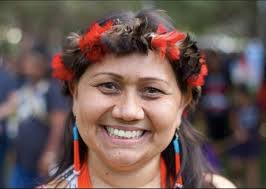
2019 Recipient
Francinara Soares Martins Baré
Federation Coordinator, Coordinating Body of Indigenous Organizations from the Brazilian Amazon
In 2017, Francinara Soares Martins Baré (Nara Baré) of the Baré people of Brazil, took the lead of the Coordinating Body of Indigenous Organizations in the Brazilian Amazon (COIAB), one of the largest indigenous organizations in South America. She represents 75 organizations, 160 peoples, and more than 400,000 indigenous peoples in nine states. She leads at a critical point when indigenous peoples and the Amazon face immense threats, including the current government’s aggressive campaign to open the Amazon to exploitation.
Her work takes place in a dangerous environment, where indigenous peoples are menaced, persecuted, and killed. Nara ceaselessly advocates for the recognition and enforcement of the rights of indigenous peoples and highlighting the importance of indigenous peoples for the survival of the Amazon: “… if there are no more indigenous peoples in the Amazon, the Amazon will die with us.”
Nara Baré not only continues the challenging fight of indigenous peoples in problematic political times, but she is paving the way for indigenous women to meaningfully participate in this fight. By successfully leading an indigenous organization that is 80% male, Nara contributes to the rise and empowerment of indigenous women—not only in Brazil but in South America and beyond. She knows that indigenous women are vital to preserve the culture and traditional knowledge of their people and to educate future generations.
Emerging Environmental Entrepreneur Award
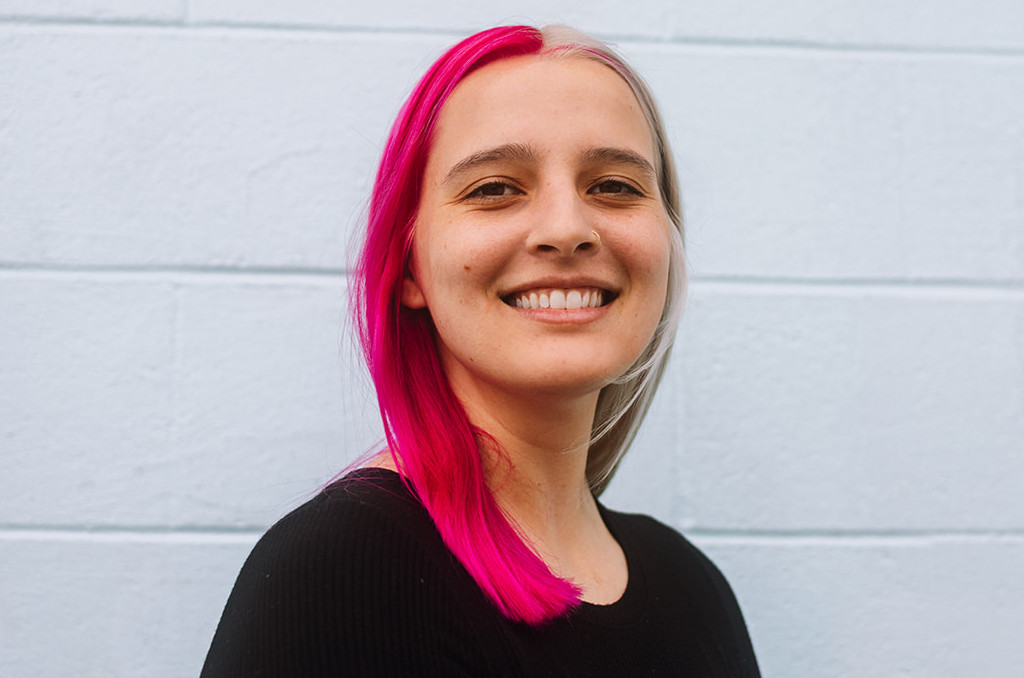
2023 Recipient
Franziska Trautmann
Co-founder and CEO, Glass Half Full
In 2020, Tulane University seniors Franziska Trautmann and Max Steitz were frustrated that the city of New Orleans did not have a glass recycling program. Their goal was not to reform the current system but to create their own glass recycling program, Glass Half Full, which converts trash glass into sand and glass cullet for coastal restoration, disaster relief, eco-construction and new glass products. It is still the only glass recycling program in Louisiana.
Born and raised in Louisiana, Franziska grew up hearing about the region’s coastal erosion crisis and experienced the lack of recycling options. At Tulane, she was recognized by the chemical engineering faculty for outstanding performance and inducted into the national engineering honors fraternity.
She was able to apply her chemical engineering knowledge to create Glass Half Full. The process starts when her team collects glass waste through their seven drop off locations across the city and their residential ($22/month), business and event (Mardi Gras!) collection service. Next, they sort by color and remove all plastic and metal components. The glass is pulverized by hammer-mill crushers at their own facility, creating sand products ranging from super soft, beach-like powder to chunky glass gravel.
Glass Half Full sells their product for a variety of applications from flooring to disaster relief sandbags to flood damage mitigation. One hundred percent of their proceeds go to support their operation.
Glass Half Full collected more than 1.5 million pounds of glass in 2022 and diverted more than 3.3 million pounds of glass waste since their start. They currently divert tens of thousands of pounds of glass from NOLA’s landfills every single week.
They partnered with the Pointe au Chien Indian Tribe to install glass gravel drains and a rain garden with native plants, deploying more than ten thousand pounds of recycled glass. In addition, they partnered with the Coalition to Restore Coastal Lousiana and U.S. Fish and Wildlife to repair a hurricane blowout zone at Big Brand Marsh National Wildlife Refuge using 20,000 pounds of recycled glass.
Franziska has only just begun and has set her sights on expanding their facility to process all glass in the state of Louisiana, as opposed to letting any of it end up in landfills. She hopes to expand their model to serve the entire Gulf South’s vast recycling demands and use the sand they produce to benefit the community and the environment.
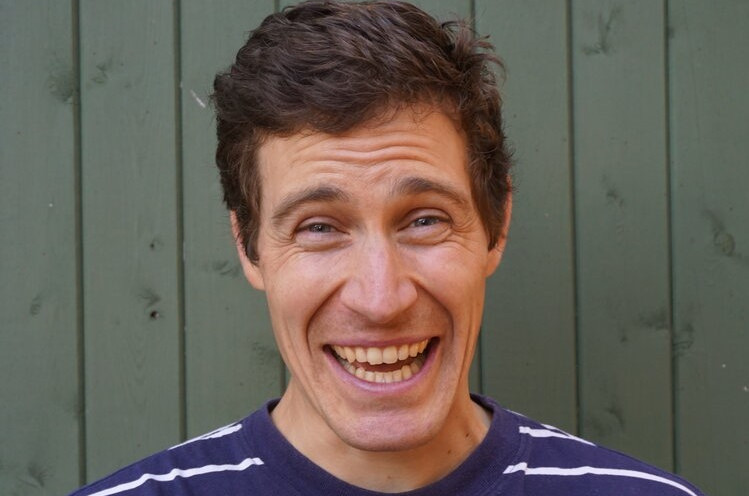
2022 Recipient
Sam Evans-Brown
Director, Clean Energy NH
Sam leads Clean Energy New Hampshire in its effort to create a cleaner, more affordable, and more resilient energy system in the Granite State. Sam grew up in the Lakes Region of New Hampshire. Prior to joining Clean Energy New Hampshire in 2021 he was a nationally known podcast host and radio journalist for nearly ten years, during which he wrote stories about New England energy issues extensively and won several regional and national awards.
Clean Energy NH builds relationships among people and organizations using a fact-based approach that offers objective, balanced, and practical insights for transforming NH’s clean energy economy and sustaining its citizens’ way of life. They educate audiences on all matters pertaining to generating, storing, and efficiently using clean energy and to accelerate technology and opportunities that provide a more prosperous, eco-friendly future. Their unique Circuit Rider programs helps more rural town energy committees access state and federal funding. Their first Circuit Rider in the North Country has already garnered more than $1M to implement energy projects that reduce operating costs and improve sustainability. We are pleased to help expand that program to the Seacoast region under Sam’s leadership.
Calling Sam, ‘one of the state’s highest-profile eco-geeks’, read this article on Sam’s transition from journalist to leader of NH Clean Energy.
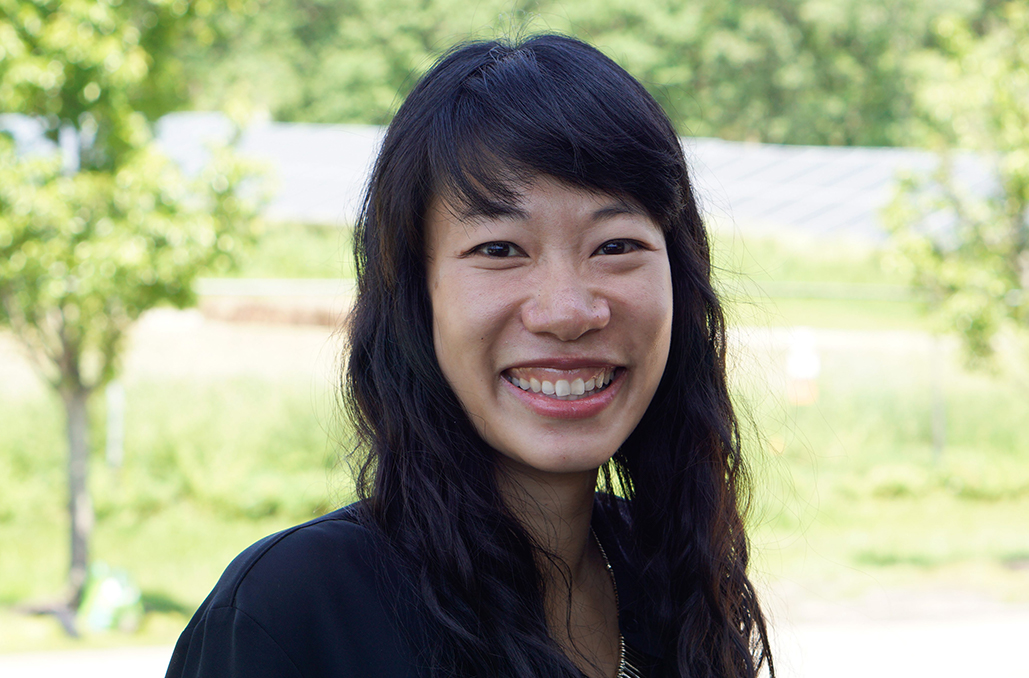
2019 Recipient
Stephanie Speirs
Co-Founder, Solstice
Steph is an entrepreneur and community builder with management experience in the Middle East, South Asia, and the United States.
Steph Speirs thinks about solar the way one might think about a community garden. Why go through the trouble of planting panels on your roof when you could instead plug into a shared neighborhood resource to access financial savings? She co-founded and runs Solstice, a social enterprise dedicated to radically expanding the number of American households who can take advantage of clean energy using community-shared solar farms.
Solstice’s financial and policy tools, including their unique EnergyScore underwriting metric, open scalable paths to inclusion for renters, low-credit households, and other Americans that have been left out of the clean energy transition. Their community organizing techniques and technology platform further make it easy for everyday Americans to access clean energy for the first time.
Steph is a Techstars alum and was selected as an Echoing Green Climate Fellow, a Global Good Fund Fellow, a Kia Revisionary, a Renewable Energy World 40 Under 40 in Solar, a Grist 50 Fixer, a GLG Social Impact Fellow, a Cordes Fellow, and an Acumen Global Fellow.
She previously led sales and marketing innovation initiatives in India at d.light, a solar products company powering areas without reliable electricity; spearheaded Acumen’s renewable energy impact investment strategy in Pakistan; developed Middle East policy as the youngest policy director at the White House National Security Council; and managed field operations in seven states for the first Obama presidential campaign.
She holds a B.A. from Yale, a Master in Public Affairs (MPA) with distinction from Princeton, and an MBA from MIT with a Certificate in Entrepreneurship and Innovation. She originally hails from Hawaii.

2018 Recipient
Alex Fried
Founder and Co Director, Post Landfill Action Network (PLAN)
Alex started with a seemingly simple question – how can we reuse ‘waste’ materials from dorm rooms from one year to the next? His answer was to found ‘Trash 2 Treasure’ when he was an undergraduate philosophy major and activist at the University of New Hampshire. He gathered volunteers, gained administration permission, organized operations, and created a financially sustainable model to establish drop-off locations for discarded TVs, fridges, furniture etc. from students heading home for the summer, and then hold a giant yard sale during move-in weekend for the incoming class. It was the first student led self-sustaining program of its kind in the country, and has collected over 200 tons of usable items since it was founded 8 years ago.
From there he launched PLAN (Post-Landfill Action Network) to support student leaders, share best practices and guide other campuses to launch and sustain student-led, Zero Waste projects. Their mission statement reads in part, “PLAN empowers our generation to be changemakers”. Today, PLAN works with and advises students and staff at over 250 campuses across the US and in 5 countries internationally.
For Alex and PLAN, this work goes beyond solving technical and logistical challenges to waste. They are focused on building a movement to challenge the linear consumption economy, address the most offending companies, and work in solidarity with environmental justice movement leaders. Through this work, PLAN has developed more than 100 international partners, including companies like Patagonia, Plastic Pollution Coalition, the PowerShift Network, and The Story of Stuff Project.
Considered a truly paradigm-shifting solution, PLAN is led by a passionate, resilient entrepreneur who has proven his ability to mobilize resources and inspire others. We will donate $10,000 in Alex’s name to PLAN to continue their good work.
CEO Environmental Leadership Award
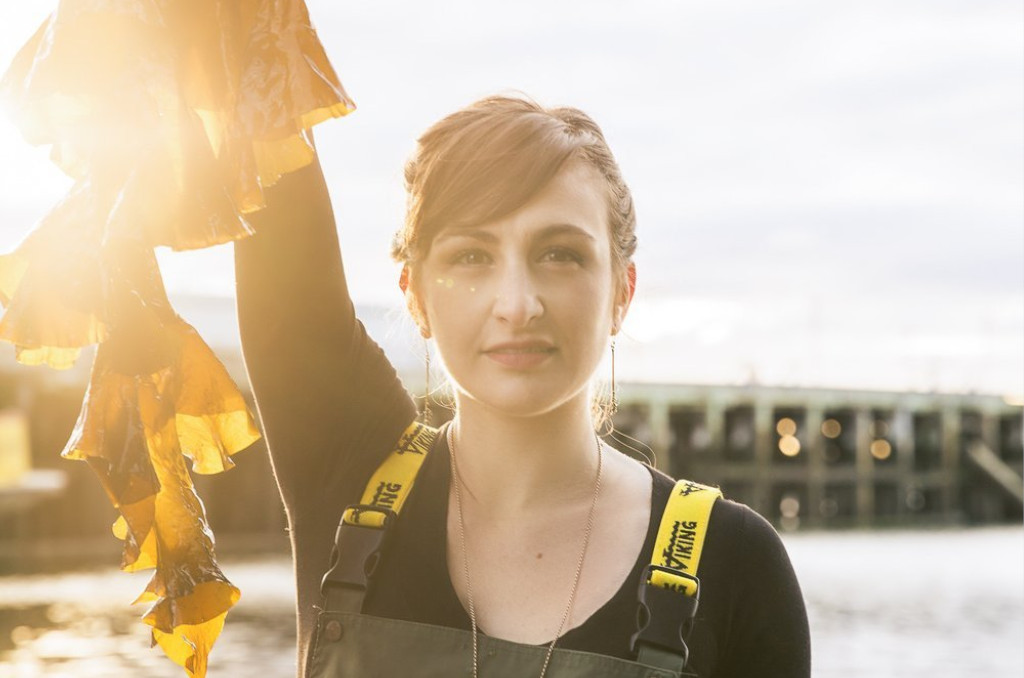
2023 Recipient
Briana Warner
CEO, Atlantic Sea Farms
Atlantic Sea Farms was founded in 2009 as a way to offer fresh, healthy alternatives to imported seaweed, diversify income for fisher families and grow kelp as a climate adaption strategy. At that time, 98% of seaweed was imported, mostly from Asia where there is little-to-no environmental regulations.
In 2018, Briana Warner took over as chief executive officer and transformed the company from the first commercially viable seaweed farm in the country to a kelp aquaculture company that is winning food industry awards and increasing consumer knowledge of kelp as a climate-positive ingredient, as well as supporting Maine’s working waterfront. Products include jars of seaweed salad and kelp kimchi, frozen cubes of kelp for smoothies, and ready-cut frozen kelp.
Briana believes good food should do good, so she made the shift at Atlantic Sea Farms from growing their own kelp to partnerships with Maine fishers because she felt they knew the waters better than anyone and have the necessary equipment. In addition, the change would allow her team to focus on a move to retail product line and marketing.
Last year, Atlantic Sea Farms harvested just under one million pounds of kelp—their largest harvest ever—with plans to increase production this year. Compare that to 40,000 pounds in 2019. Atlantic Sea Farms produces 80% of US-grown seaweed. The company employs 16 direct employees and works with 30 small fish-farmer family businesses.
Briana started her career as a diplomat in the United States Foreign Service including service in Guinea for the country’s first democratic election. After moving to Maine, she founded Maine Pie Line, a beloved Portland bakery that employed newly settled refugees. After selling the pie business, she joined the Island Institute where he helped fishers diversify into different forms of aquaculture.
In addition to receiving the 2023 Alnoba CEO Environmental Leadership Award, Briana and the Atlantic Sea Farm team has been recognized with the Fast Company’s Brands that Matter Award as well as the Governor’s Award for Business Excellence, a Heritage Industry Award and a NEXTY Award for Best New Product Supporting a Plant Based Lifestyle
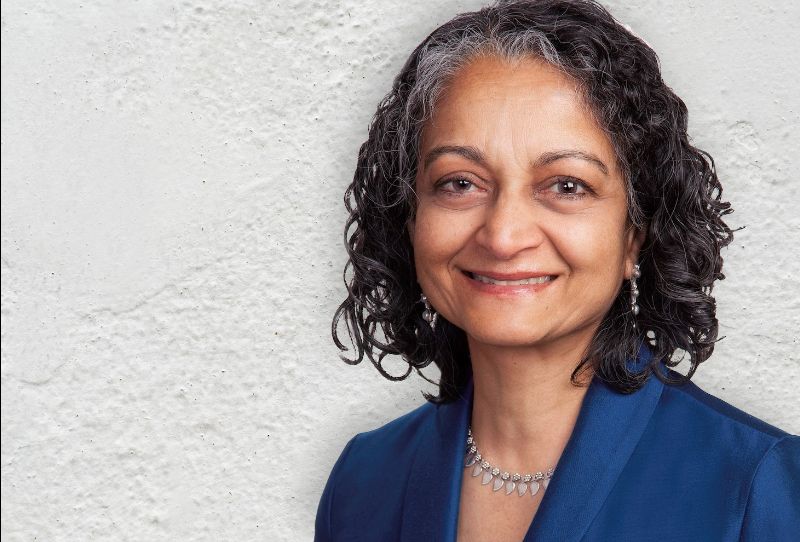
2022 Recipient
Geeta Aiyer
Founder and CEO, Boston Common Asset Management
Geeta Aiyer combines over 30 years of experience in finance, with passion for environmental and social justice. Under her leadership, Boston Common has built a strong investment record, and meaningfully improved the policies and practices of portfolio companies through impactful, proactive Shareowner Engagement. The firm is a “Best for the World” honoree within the global B Corp community. Here is a recent article in GreenBiz, featuring Geeta as one of “25 more badass women shaping climate action.
The mission of Boston Common Asset Management is ‘Activate investor capital toward solutions for people and planet’. It is a majority women founded owned and led investment firm that has been recognized as a pioneer in the Environmental, Social, and Governance investment field with a long history of investing in companies that are accelerating the transition to a low carbon economy including companies focusing on renewable energy, climate mitigation and adaption, more efficient processes, and circular economics. BCAM fully divested from fossil fuels in 2019.
BCAM became 1st asset manager to join the Partnership for Carbon Accounting Financials and helped develop global carbon accounting standards. In 2015 BCAM began measuring and reporting its portfolios’ carbon footprint. Also joined the Net Zero Asset Managers initiative alongside 73 global asset managers representing $32 trillion in AUM and commits to aligning their investments to net zero by 2050.
Her 5 year flagship initiative, Banking on a Low Carbon Future, underpins need for the financial sector to step up on climate, and has engaged nearly 60 global banks on climate risks and opportunities. She is co-founder and board chair of DAWN (Direct Action for Women Now), a global nonprofit with a mission to end gender-based violence and advance gender equality through education and collaboration.
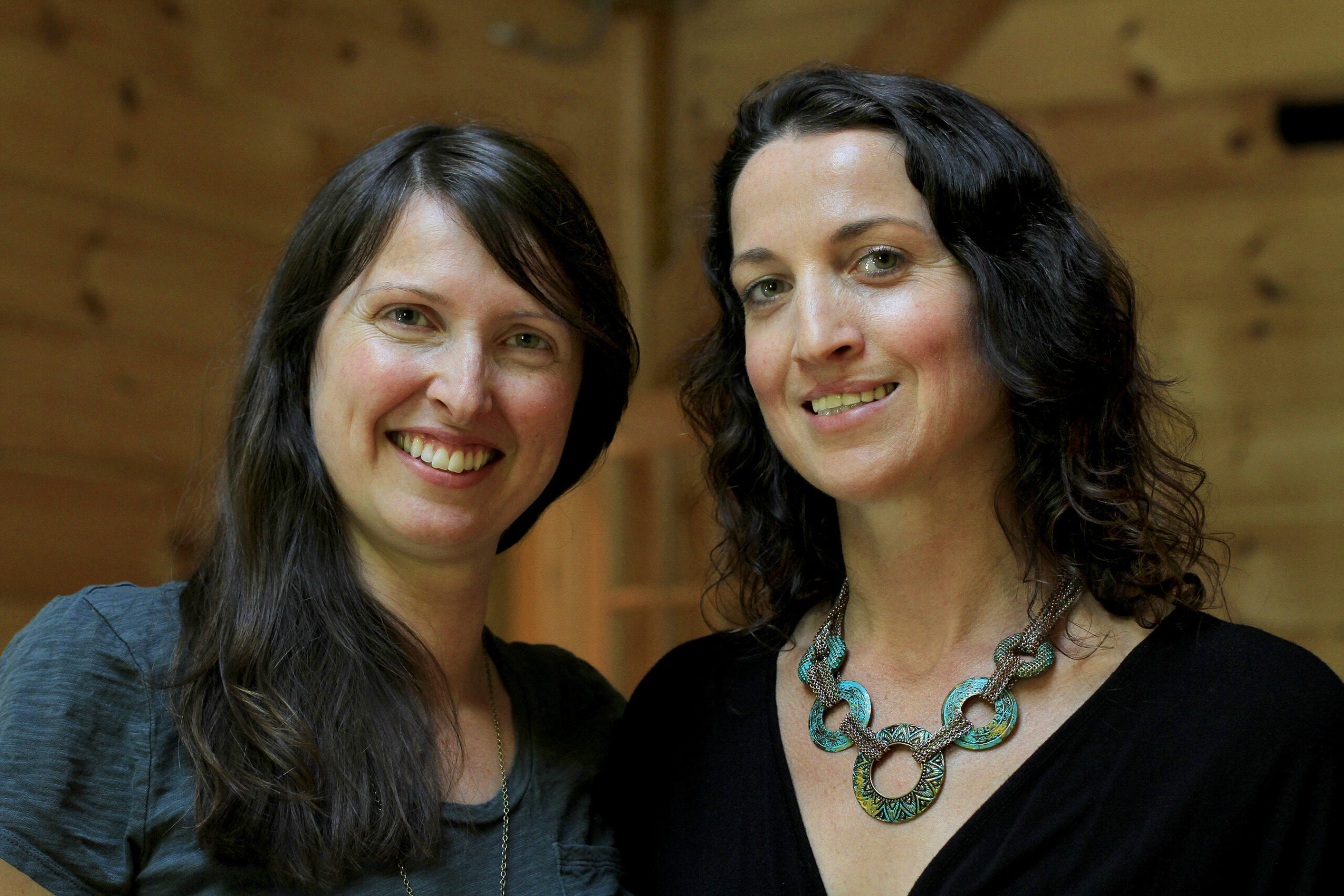
2021 Recipients
Rebecca Hamilton & Emily Schwerin-Whyte
Co-CEOs, W.S. Badger & Company
Rebecca and Emily are 2nd generation owners/CEOs and daughters of founder, Bill Whyte. The two worked along side their father guiding operations and strategic planning before taking on their roles as CEO’s in 2018. They believe that the company’s impact on the environment and communities is a critical measurement of their success.
W.S. Badger & Co. makes over 100 organic and natural products in environmentally friendly manufacturing facilities that are sold in 20 countries. In the last year they’ve installed enough solar panels to offset 150% of their operating demand. They have also incorporated sustainability initiatives such as water reduction and plastic free packaging for all of their products. We are truly inspired by their example on how to successfully drive an organization forward while being environmentally and socially responsible.
Rebecca and Emily are long-time advocates of ethical business and social justice policies around climate change and fair minimum wage. Together they actively lobbied for state’s public benefit corporation legislation; Safe Cosmetics legislation, which is currently unregulated.
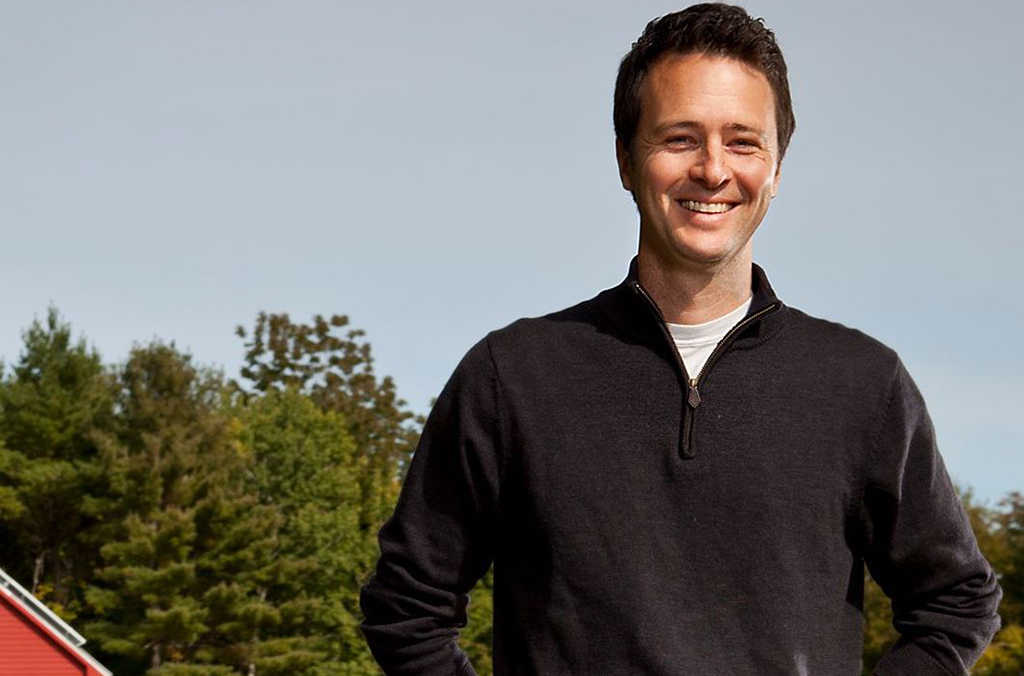
2019 Recipient
Matthew O’Malia
Founder/GO LOGIC, OPAL, AND GO LAB
When you look for heroes, you should always look in your own backyard. When we saw Matt’s nomination come through it made perfect sense to us to honor someone who blazed the trail in New England for Passive House design and who is now redefining the sustainable design industry.
In 2013, we gave Matt a seemingly impossible task—transform a set of New England meeting house timber frames into a Passive House standard building. Calm and unfazed, Matt set about to design Alnoba to be the first Passive House standard building of its kind in the northeast, which uses 75–90% less energy and blends 19th century craftsmanship with 21st century green technology.
An award-winning architect, he became a leader in Passive House design in the U.S. and speaks internationally on sustainable design. He cofounded GO Logic, a design/build firm that is focused on developing a practical, cost-effective approach to meeting the ultra-high-performance Passive House standard, which uses 90% less energy in space heating when compared to traditional buildings. Their first project, the GO Home, became the first certified Passive House building in Maine. Next, he went on to found GO Home, which provides predesigned, prefabricated homes for New Englanders, and use 90% less energy. This spring he launched OPAL, an architecture firm that is focused on creating the next generation of large-scale Passive House, carbon-positive buildings.
Believing a “well-insulated home can change the world,” Matt launched his latest venture, GO Lab, which will help transform the forest products economy by creating a manufacturing facility in a former paper mill in Madison, Maine. It will turn daily shipments of wood chips from Maine’s lumberyards into affordable, sustainable insulation and create good-paying jobs.
Knowing that buildings produce 44% of carbon emissions, GO Lab believes that “the survival of the planet is at risk unless critical industries change the way they do business.”
Matt has spent his career rethinking every detail of building construction, with an eye toward high performance, quality, and sustainability. He is an architect, entrepreneur, and visionary leader.
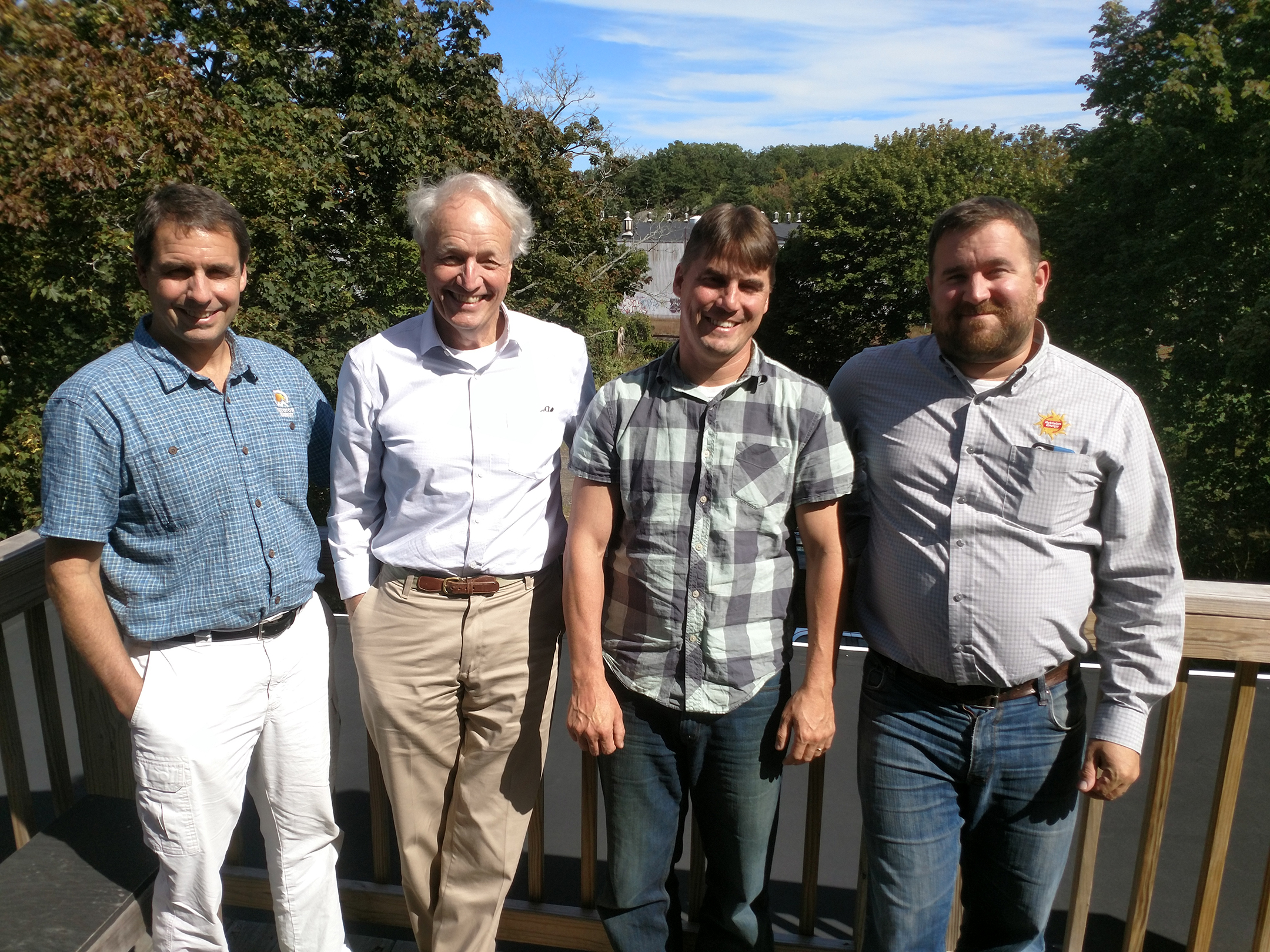
2018 Recipient
Leadership Team
Revision Energy
Phil Coupe
Bill Behrens
Fortunat Mueller
Dan Clapp
As a certified B Corp, ReVision stands out as the #1 renewable energy company in northern New England for building a cohesive workplace of employee owners, for their advocacy on climate policy and education, for their philanthropy and community-building efforts, and finally for developing innovative financial models to solarize nonprofits.
ReVision has more than 260 employee-owners and is ranked the #1 rooftop solar installer in New England and #5 in the nation by Solar Power Industry Magazine. Four of ReVision’s five offices run almost entirely without fossil fuels. Their vehicle fleet consists of plug-in electric cars, hybrids and trucks that run on biodiesel, and they provide incentives for employees to reduce their own carbon footprints.
ReVision spearheaded the “Power on Puerto Rico” initiative to design, build and ship off-grid emergency portable solar power units to remote communities in Puerto Rico after Hurricane Maria. They also donate equipment and labor to help local nonprofits go solar, like the Crossroads House shelter in Portsmouth, Habitat for Humanity, and several public schools in Maine and New Hampshire.
Perhaps their most innovative program is their new investment fund called ReVision Solar Impact Partners, which aligns impact investors and tax equity financing with cashstrapped nonprofits, to enable them to acquire solar energy to increase their long-term economic and environmental sustainability. Their boundless energy, technical competence and unwavering optimism charges all our batteries!
Moment of Truth Award
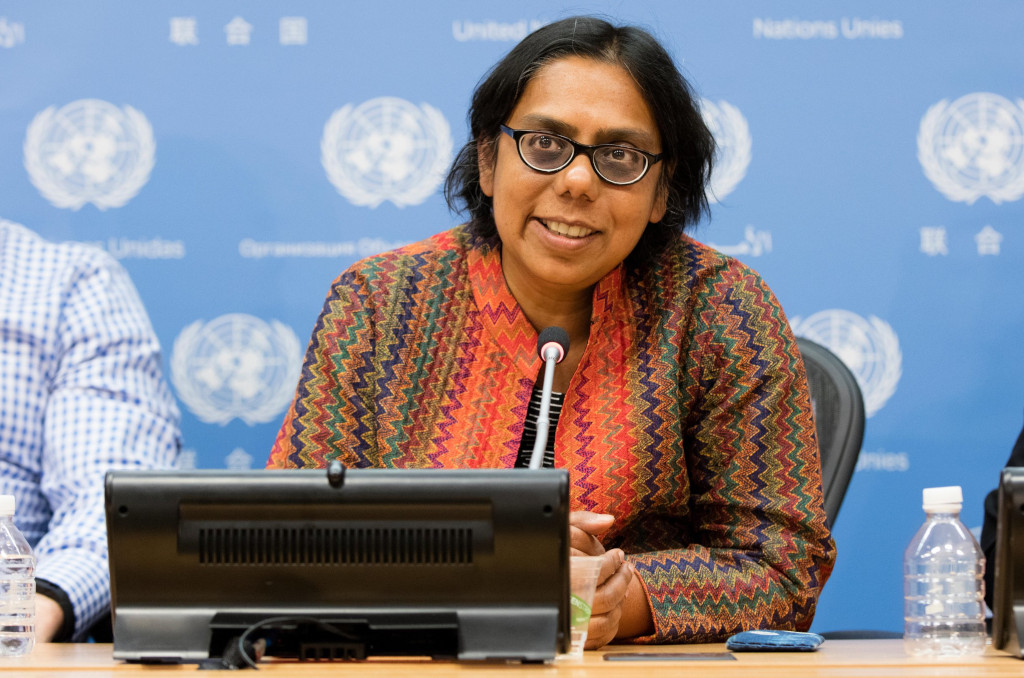
2023 Recipient
Ruchira Gupta
Founder, APNE AAP Women Worldwide
For more than three decades, Ruchira Gupta has campaigned for a world where no girl or woman is bought or sold. Along with 22 courageous women in prostitution, she founded APNE AAP Women Worldwide, which is a grassroots Indian organization that empowers marginalized girls and women to resist and end sex trafficking. To date, she has helped more than 20,000 women and girls escape prostitution.
Ever since childhood, Ruchira wanted to be a storyteller just like her father. She especially wanted to write stories about girls who fix problems and so became a journalist. While on assignment in Nepal, she stumbled upon rows of villages with missing girls and asked the villagers where all the girls were. That question changed her life. She learned that little girls as young as twelve were smuggled across the border and sold into brothels in India. She related the story in a documentary, The Selling of Innocents, and won an Emmy for Outstanding Investigative Journalism.
As a journalist, she had covered famine and conflict, but had never witnessed such intimate violence and on this scale. Wanting to do more, she quit journalism and started APNE APP inside the red-light areas of India and began to work with the United Nations all over the world.
APNE AAP has two-pronged approach:
1. Reduce supply by increasing the choices before the weakest and most marginalized girls and women from red-light areas, including those trapped in intergenerational prostitution, and lower-caste communities and
2. Reduce demand by deterring the purchase of sex through policy and social change.
I Kick and I Fly is her debut fiction novel based on the true stories that she witnessed and experienced as an activist in APNE AAP. She has been given the French Ordre National du Mérite, Clinton Global Citizen Award, and the UN NGO CSW Woman of Distinction award among other honors for her contribution to the establishment of the UN Trafficking Fund for Survivors, the passage of the US Trafficking Victims Protection Act and her grassroots activism with APNE AAP. She has co-written a book with Gloria Steinem, As if Women Matter, and edited two anthologies, River of Flesh and Renu’s Letters to Birju Babu.

2022 Recipient
Loretta J. Ross
Activist, Public Intellectual and Professor
Loretta’s activism began at 16 when she was tear-gassed at a demonstration as a first-year student at Howard University in 1970. She was one of the first African American women to direct a rape crisis center in the 1970’s, where she used her own story of sexual assault to facilitate a conversation with incarcerated rapists, teaching them Black feminist theory.
As part of a 50-year history in social justice activism, she was the national coordinator of the SisterSong Women of Color Reproductive Justice Collective from 2005–2012, and co-created the theory of Reproductive Justice in 1994.
Ross’s mentor, the legendary C.T. Vivian, told her when she started her job, “When you ask people to give up hate, you have to be there for them when they do.” And so she was. She monitored hate crimes, accompanied Floyd Cochran, national spokesman for Aryan Nation, on his atonement tour and taught anti racism to some whose families were members of the KKK.
Ross was national co-director of the April 25, 2004 March for Women’s Lives in Washington D.C., the largest protest march in U.S. history at that time with 1.15 million participants. She founded the National Center for Human Rights Education (NCHRE) in Atlanta from 1996–2004. Before that, she was the program research director at the Center for Democratic Renewal/National Anti-Klan Network, where she led projects researching hate groups and working against all forms of bigotry with universities, schools and community groups.
She launched the Women of Color Program for the National Organization for Women (NOW) in the 1980s and was national program director of the National Black Women’s Health Project.
Here is an article in New York Times, “What if Instead of Calling People Out, We Called Them In?” on Professor Ross’s latest work to stop shaming, bullying and calling out to heal our divide.
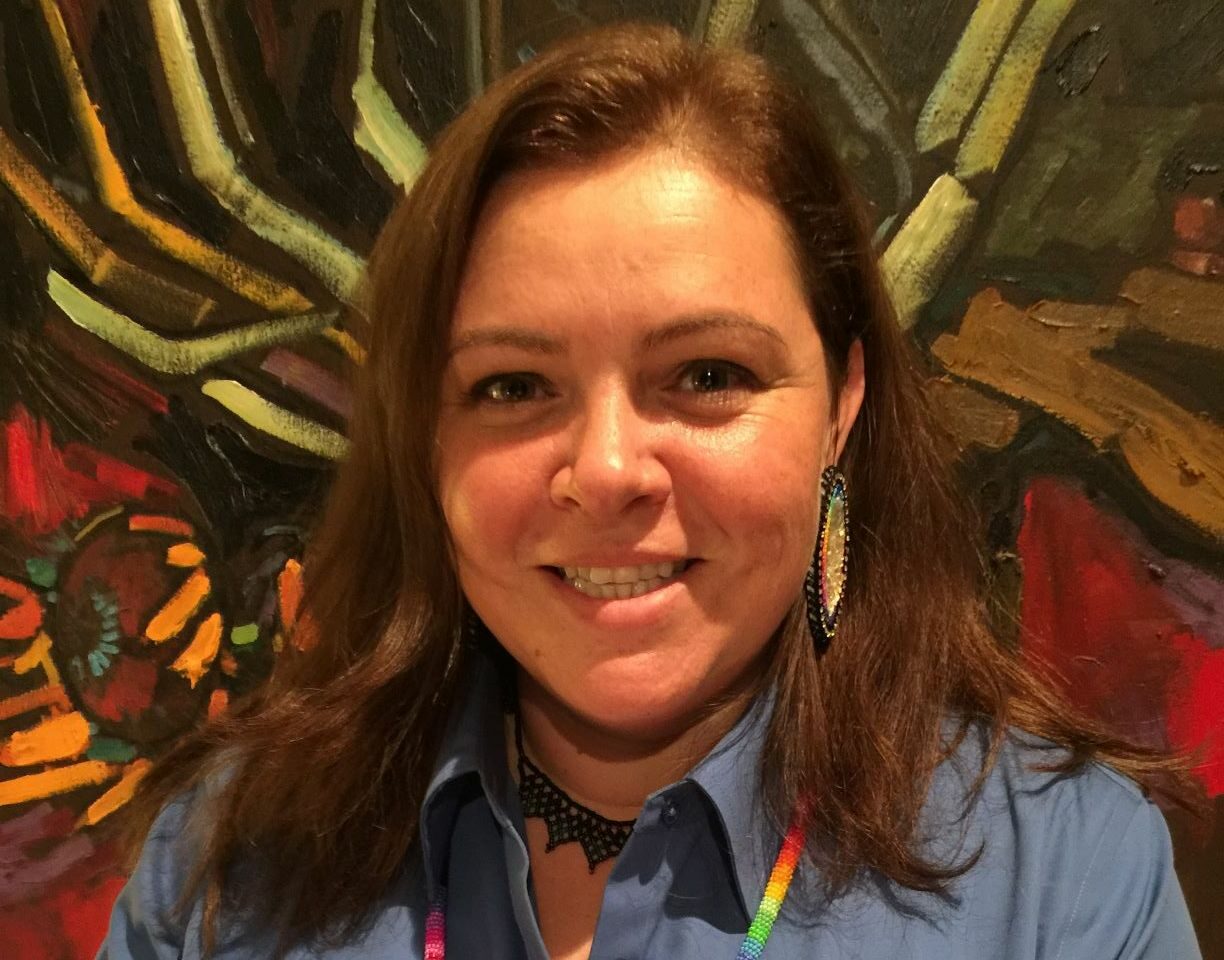
2021 Recipient
Christa Big Canoe
Legal Advocacy Director, Aboriginal Legal Services
Right now, four out of every five Indigenous American women are affected by violence, and are murdered at rates more than 10 times the national average. By far the majority of those crimes are committed by individuals from outside the Native American community, often falling through jurisdictional cracks. It’s a crisis that demands action–a crisis that prompted Christa Big Canoe to take the kind of bold action that leads to big impact.
Christa is the Legal Advocay Director for Aborignal Legal Services (ALS), a nonprofit organization that works with the families of missing and murdered indigenous women (MMIW) navigate the legal system to find justice for their loved ones.
In 2017, Christa was appointed Senior and then Lead Commission Council for Canada’s National Inquiry into Missing and Murdered Indigenous Women and Girls. Christa took a two and a half year leave from her work at ALS to lead thirteen Indigenous lawyers, twenty-six statement gatherers and a support team responsible for collecting truth from survivors and families. The testimonies from “truth finding gatherings” have created one of the largest evidentiary records in Canada.
Christa also represented six of the seven families in the “Seven Youth Inquest” in Thunder Bay. This investigation of the deaths of seven Indigenous students resulted in 145 federal and provincial recommendations to improve accountability, safety and education outcomes for Nishnawbe Aski Nation youths. While at Legal Aid Ontario, she led the province-wide Aboriginal Justice Strategy aimed at removing barriers to the legal system for indigenous people.
Christa’s unwavering courage to confront this critical issue and take action to bring about real change makes her an exceptional leader and we are proud to honor her with this award.

